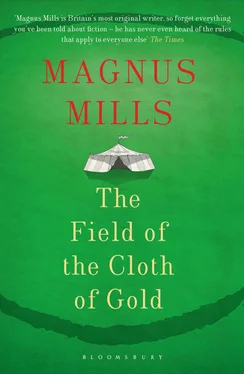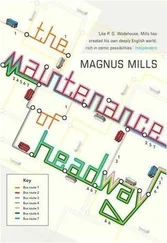Hogust, in the meantime, had taken several paces away from his rowdy associates. He was now standing alone, peering at the vacant swathe of grass that lay before him. Evidently something had caught his attention. All of a sudden he turned on his heels and rejoined the others, snapping out a new set of instructions. A howl of protest rose up, but Hogust silenced it by cuffing the ear of the man nearest to him. After that, they all did as they were told. With their leader urging them to get a move on, they quickly reloaded the boats and hoisted the sails. Finally, they pushed off and headed back upriver.
Hen and I witnessed the undignified withdrawal in astonishment.
‘What’s caused that, I wonder?’ said Hen.
‘Not sure,’ I replied. ‘Let’s go and have a look.’
We made certain the visitors had properly gone, then strolled over to the south-east. It was eerily quiet, and there was nothing to suggest that only ten minutes earlier a horde of unruly men had been roving all over the place. The only signs of habitation were those left by Aldebaran and his people. During the past week, the flattened grass had begun to make a partial recovery. Nonetheless, we could plainly see the impressions left by a multitude of tents. They stretched away in every direction and told the story of a huge force recently departed. The vision they conjured up must have unnerved Hogust; hence his rapid retreat.
The truth, of course, was slightly different: the impressions in the grass were the last traces of a fading power that was unlikely ever to return. If he’d so chosen, Hogust could have stayed where he was for as long as he wished. Unfortunately for him, he seemed to have been ambushed by his own imagination.
Even so, the incident had demonstrated yet again the need for a permanent presence in the south-east. Ideally, it required a person of substance to fulfil the role: someone whose natural gravitas expressed their irrefutable right to be there; someone whose tent was majestic rather than showy; grand but not overbearing. Only when this was achieved would the other residents feel less imposed upon, and only then would outsiders like Hogust be dissuaded from chancing their luck.
As it transpired, we hadn’t seen the last of that character. The following morning his boats landed in the north-east, and again the men brought their baggage ashore. They completely ignored Hartopp, who was watching from a short distance away; then, without a ‘by your leave’, they began setting up camp right next door to him. Needless to say, they didn’t go about this task quietly: it appeared every move, however small, entailed a stream of shouting, horseplay and general rowdiness. Bedecked with barbaric pennants, their tents were garish and ugly. They pitched them side-by-side and back-to-back, all jammed together with hardly a space in between. It was a tight squeeze, and by the time they’d finished they were practically butting up against Hartopp’s meticulously ordered encampment.
Understandably, Hartopp was appalled but, as he later remarked, there was nothing he could do. Hogust and his confederates had as much right to be in the field as anybody else.
‘We’ve no choice,’ said Hartopp in a resigned tone. ‘I’m afraid we’ll just have to learn to live with them.’
Why Hogust decided to settle so close by was anybody’s guess. The only explanation I could think of was that he’d seen Hartopp’s upturned boats and recognized him as a fellow sailor. All the same, the notion of going and introducing himself seemed not to have entered Hogust’s head. Instead, once established, he started poking around the area, presumably in search of plunder. At one stage he barged into the clump of nettles, apparently insensitive to their stings, and studied the three boats in detail. He tapped their hulls and prodded their keels for signs of rot, then ran his hands over the paintwork as though contemplating whether it was worthwhile salvaging the vessels. I could have told him they were in superb condition (they were bound to be, knowing Hartopp) but that was beside the point. Obviously Hogust had no concept of private property; and it was equally obvious that Hartopp would need to keep a sharp eye on him.
In the meantime, some of the crew had forayed inland. Eventually, they encountered the trench crossing their path. It, too, was now full of burgeoning nettles, but undeterred they jumped across and climbed onto the grassy embankment. There they stood gazing into the south, but for some reason they ventured no further. I could see them clearly from my tent, and I noticed they all had jutting brows. They grinned at me for a moment or two, and I nodded in acknowledgement; then they went back the way they’d come. Seemingly, they’d roamed far enough for the present.
It was difficult to tell if they were going to be a perpetual nuisance, or whether they would quieten down after a day or two. Sadly, the forecasts were not encouraging. To judge by the constant racket they made, they had absolutely no consideration for the people living around them. Nor was there any let-up when darkness fell: the noise persisted throughout the evening as they caroused and argued on the river bank. I lay awake in my tent and reflected on the peaceful life we’d known long ago, before the advent of strident bugles, tuneless clanging and boisterous laughter, when the only sound had been the gentle stirring of the wind. Those days were now remote indeed.
Ultimately, however, even Hogust and his men required sleep. Sometime after midnight they went to bed and silence descended over the field at last. For a while I continued listening, just to make sure there was nobody on the prowl. As a matter of fact I did hear something: a kind of distant murmuring, or perhaps a whirring of wings; but then it, too, subsided. I pondered the question of the newcomers and realized that Hartopp was probably correct: we would simply have to learn to live with them. Finally, I sank into a deep sleep.
In the morning I was slowly awoken by the sunlight filtering through my canvas walls. All was quiet, and I assumed the longboatmen were still at their slumbers. The height of the sun told me I’d slept much later than usual, so after a few more minutes I roused myself and got up. I unfastened my doorway, then peered outside and beheld a shimmering white tent in the south-east.
Blinking with disbelief I looked again, but I was not mistaken. The tent stood in exactly the same place as it had before, dominating the river and perfectly befitting its lush surroundings. Moreover, it still retained its air of timelessness, so that it appeared to have been there for ever, rather than only a few hours. The tent’s magnificence was beyond compare. Splendid and gracious in equal measure, it bestowed a certain tranquillity upon the Great Field, and for these reasons I welcomed its return.
Even so, my feelings were tempered when the doorway parted and Thomas emerged. As usual he was barefoot, bearded, and dressed in flowing white robes. He paused a moment, and I waited for him to glance around the field in his usual all-encompassing manner. Instead, though, he turned and addressed someone inside the tent. This I found rather perplexing because in the past he’d always travelled alone; indeed, his self-regard was so inflated that I wouldn’t have thought he needed any companionship.
I watched with mounting interest as the conversation continued. Thomas was now standing fairly close to the entrance, his shoulders hunched and his arms outstretched, and gradually I realized that it was not so much a conversation as an argument. Furthermore, to judge by his awkward stance, Thomas seemed to be losing. The person inside the tent clearly had him on the ropes, and casually I wondered what he could have done to deserve such disapprobation. Perhaps if he’d raised his voice a little I could have picked up a few details, but to his credit Thomas remained calm and merely shrugged in a gesture of apparent defeat. Next moment he headed towards the crossing. I had no idea whether he saw me peering out from the recess of my tent; if he did, he gave no indication, but I sensed that he’d rather nobody had witnessed his discomfiture. Accordingly, I withdrew slightly into the shadows.
Читать дальше












